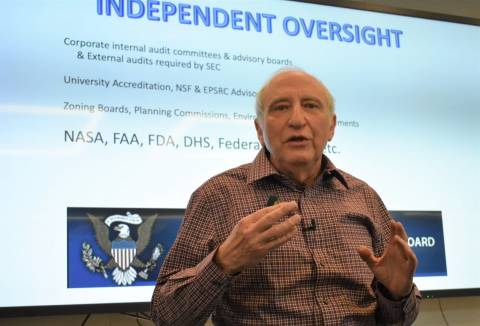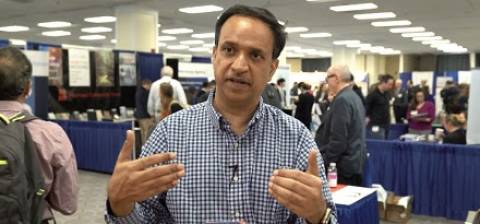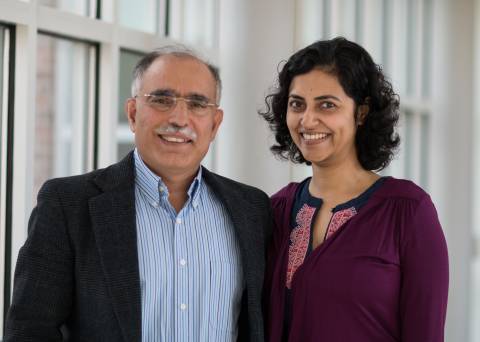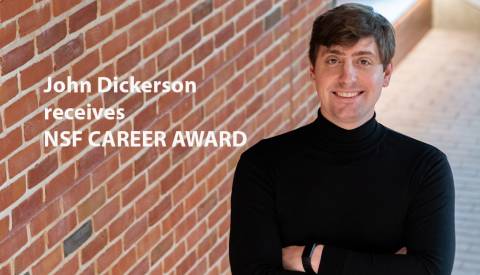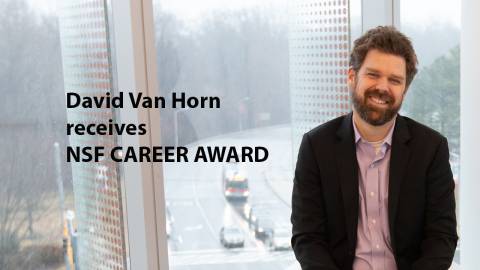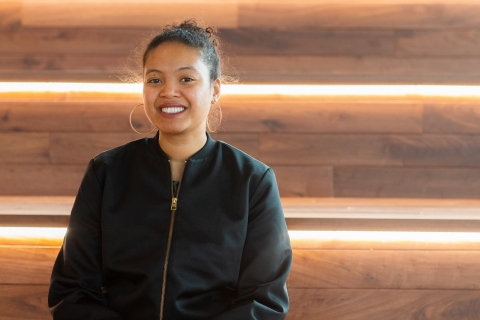Recent News & Accomplishments
2019
Professor Dinesh Manocha and Dean Amitabh Varshney among presenters
Prime Minister Andrej Babiš of the Czech Republic made a quick stop at the University of Maryland on March 6 to learn about research involving artificial intelligence, robotics, computer vision, and virtual and augmented reality. The prime minister was on a state visit to the U.S., accompanied by his aides and international journalists. The visit was hosted by ISR Director William Regli (CS/ISR) and the university’s Office of International Affairs. Three demonstrations were presented in the Maryland Robotics Center’s Robotics Realization Lab. Professor Rama Chellappa (ECE/CS/UMIACS) and... read more
Emeritus Professor Ben Shneiderman has been featured in an article in GeekWire on the future of artificial intelligence policy in the United States. During a panel at the Allen Institute for Artificial Intelligence, moderated by AI2 CEO Oren Etzioni, Shneiderman proposed that a National Algorithms Safety Board that functions in a similar fashion to the National Transportation Saftey Board (NTSB). He suggests that is a possible model to ensure that proper action is taken during algorithmic failures. This NASB would have experts who could determine remedies to problems caused. Shneiderman... read more
on the Future of Robotics
In late February Professor Dinesh Manocha was interviewed by AAAS on the future of robotics. He was an exhibitor the Annual Meeting for the organization in which he demonstrated three very exciting Maryland inspired robots called Robo Terp, Robo Crab, and Robo-Raven. Manocha was made a fellow of the organization in 2011. One of the most important questions asked in the interview was about the future of robotics at the University for our students: *** What draws your students to this technology today? I get all kinds of students, especially at Maryland. I’m teaching a class on robotics. I’m... read more
Saha was advised by Professor Samir Khuller
Barna Saha (Ph.D, '11) has been named to the newest class of Sloan Fellows. Saha, advised by Professor Samir Khuller, is a theoretical computer scientist who also works on the mathematical foundations of data science. She is an assistant professor of the University of Massachusetts Amherst College of Information and Computer Science. "I try to determine the fastest possible algorithms for important optimization problems. I have managed to find significantly faster approximation algorithms for problems including shortest paths in graphs, matrix multiplication over certain algebraic structures... read more
Dickerson is an Assistant Professor of Computer Science and an Artificial Intelligence Researcher
Assistant Professor John Dickerson has received an NSF CAREER Award for his work entitled Scalable and Robust Dynamic Matching Market Design . Dickerson’s work will connect artificial intelligence and matching market theory and practice to investigate how matching markets—systems that pair individuals to products or to other people—can be improved even as their particular goals must closely adhere to stakeholders’ value judgements and operate under forms of uncertainty. Citing disparate examples in which matching theory is used, including organ allocation and exchange, graduate school... read more
Van Horn is an Assistant Professor of Computer Science and Researcher in Programming Languages
Assistant Professor David Van Horn has received an NSF CAREER Award for his work entitled Gradual Verification: From Scripting to Proving . His work will investigate the theory and pragmatics of next generation programming languages that enable users to gradually adopt automated verification and formal method techniques for making software with strong behavioral guarantees. These next generation languages will bridge the gap between today's expressive, widely-used programming languages like JavaScript and Haskell and verification-oriented languages like Coq and F*, which are used by more... read more
In a recently published paper CS researchers proposed an intuitive method to facilitate constructing artificial neural networks. The method, inspired by human learning, proposes a multi-stage information distillation approach using multi-resolution features and feedbacks. The method facilitates information propagation and makes neural networks more efficient and easier to visualize. Chengxi Ye, Chinmaya Devaraj, Michael Maynord, Cornelia Fermüller and Yiannis Aloimonos, "Evenly Cascaded Convolutional Networks," 2018 IEEE International Conference on Big Data (Big Data), Seattle, WA, USA, 2018... read more
Assistant Professor Leilani Battle has received an NSF CRII award for her research entitled CHS: Modeling Analysis Behavior to Support Interactive Exploration of Massive Datasets . Her project works to improve the visualization and data management systems that scientists and other analysts use to extract and understand information on both broad and granular scales. By integrating these two types of systems, her work will infer user goals and future behaviors based upon the ways in which they have previously accessed and used the above mentioned systems. Battle joined the Department of... read more
Professor Samir Khuller and Professor Aravind Srinivasan have each received an Amazon Research Award (ARA) for 2018. Khuller and Srinivasan are two of eighty-two top researchers from around the world to have received this award. Their work—and the work of their students—will have contributions to open-source projects. ARA aims to fund projects that lead toward a PhD degree or conducted as a part of post-doctoral work. Khuller and Srinivasan will each work with an Amazon research contact and may choose to speak to researchers at Amazon worldwide about their projects. As ARA recipients, Khuller... read more
With alumnus Xiao Wang (PhD'18), he will build protocols for secure multiparty computation
Announcement from the Maryland Cybersecurity Center : Jonathan Katz, a professor of computer science and director of the Maryland Cybersecurity Center (MC2) who also holds an appointment in the University of Maryland Institute for Advanced Computer Studies (UMIACS), is working with a former MC2 graduate student and an international startup to design and build protocols for secure multi-party computation (MPC). MPC protocols allow a group of parties—each holding their own private input—to compute an arbitrary function of their collective inputs in a distributed fashion, without revealing any... read more

